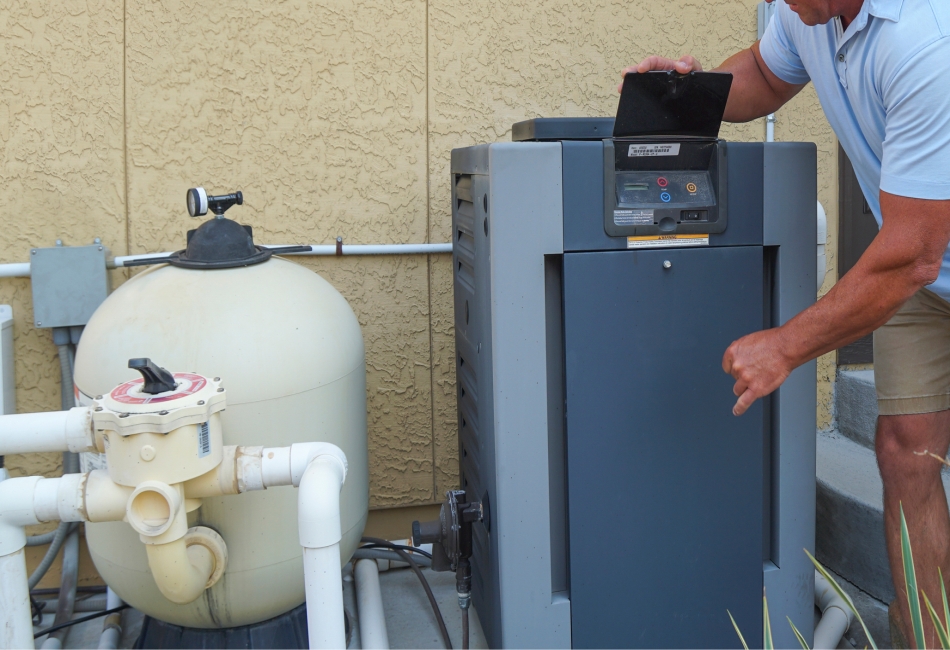If you’ve ever planned a weekend pool party only to find the water too chilly for a comfortable swim, you know how essential it is to understand pool heating times. Propane heaters are a popular choice for many pool owners due to their efficiency and fast heating capabilities. But just how long does it take to heat a pool with a propane heater?
The answer isn’t always straightforward. It depends on several factors including pool size, starting water temperature, the desired temperature increase, environmental conditions, and the power of your heater. Fortunately, using propane pool heaters can significantly reduce waiting time compared to other methods.
In this post, we’ll break down the variables, compare propane heating to other options, and help you plan ahead so your next swim is always warm and welcoming.
Propane Pool Heating: Fast, Powerful, and Reliable
One of the reasons propane heaters are so widely used is because they provide quick, reliable heat regardless of weather conditions. Unlike solar heaters that rely on sunlight or heat pumps that depend on air temperature, propane heaters can operate efficiently even on cloudy or cool days.
On average, a propane heater raises the temperature of pool water by 1 to 1.5 degrees Fahrenheit per hour. That means heating a standard 20,000-gallon pool by 10 degrees could take 6 to 10 hours, depending on variables like the heater’s BTU rating and outdoor temperature.
BTU Ratings and Heating Time
BTU (British Thermal Unit) measures a heater’s energy output. A higher BTU rating means faster heating. For example:
- A 250,000 BTU propane heater can raise the temperature of a 20,000-gallon pool by about 1 degree per hour.
- A 400,000 BTU heater can do the same job in just over 30 minutes per degree.
Of course, the more significant the temperature increase you require, the more time and propane it will take.
Variables That Affect Heating Time
While propane heaters are known for speed, several factors influence how long it actually takes to heat your pool:
1. Pool Size and Volume
Larger pools contain more water, requiring more energy and time to heat. A small 10,000-gallon pool may heat up in a few hours, while a 30,000-gallon pool could take twice as long.
2. Starting Water Temperature
If your pool has been sitting unused for days or weeks, especially during cool nights, the starting temperature could be quite low. Heating from 60°F to 80°F takes considerably longer than from 72°F to 82°F.
3. Desired Temperature Increase
The more degrees you want to raise the water, the more time it takes. A 5-degree boost may only require a few hours, while a 15-degree increase can take most of the day.
4. Outdoor Temperature and Wind
Cooler ambient temperatures and windy conditions pull heat away from the pool surface, slowing down the heating process. Using a pool cover can help retain heat and reduce heating time.
5. Heater Efficiency and Maintenance
A well-maintained propane heater operates more efficiently than one that is clogged or aging. Regular service, clean filters, and proper ventilation all contribute to faster, more effective heating.
Comparing Propane Heating to Other Methods
How does propane heating stack up against other popular options? Let’s take a look.
Electric Heat Pumps
Heat pumps are energy-efficient and cost-effective in warm climates, but they heat water more slowly. On average, a heat pump increases pool temperature by 1 degree per hour but only works well when the ambient air temperature is above 50°F.
Solar Heating
Solar heating is eco-friendly and free to operate, but it’s the slowest and most inconsistent option. Heating time depends on sunlight availability and panel size. Overcast days or shaded areas reduce effectiveness.
Natural Gas Heaters
Natural gas heaters offer performance similar to propane, but they require a gas line hookup. If your property doesn’t already have one, installation costs can be significant.
Tips to Speed Up Pool Heating with a Propane Heater
Even with a powerful propane heater, there are ways to optimize the process and reduce heating time and energy use:
- Use a pool cover: This traps heat and minimizes evaporation, especially overnight.
- Preheat strategically: Start heating your pool several hours before use to ensure ideal temperatures.
- Schedule regular maintenance: Keep your heater clean and tuned for optimal performance.
- Insulate your pool: Consider solar blankets or thermal covers to hold in heat.
Planning Ahead: How to Calculate Heating Time
To estimate how long it will take to heat your pool, you can use this simplified formula:
BTUs required = Gallons of water x 8.34 x Temperature rise (in °F)
Then divide the total BTUs needed by your heater’s BTU output per hour.
Example: To raise a 20,000-gallon pool by 10°F:
- 20,000 x 8.34 x 10 = 1,668,000 BTUs
- If you have a 250,000 BTU heater: 1,668,000 / 250,000 = ~6.67 hours
This formula provides a rough estimate and doesn’t account for heat loss due to wind or evaporation, but it’s a useful planning tool.
Is a Propane Heater Right for Your Pool?
If speed and flexibility are your priorities, a propane heater is a great investment. It offers consistent heating performance regardless of weather, making it ideal for last-minute swim plans or extended seasons. When used efficiently, it can balance comfort and energy costs effectively.
As you weigh your options, remember that choosing the right size and model is just as important as the type of heater. For reliable performance, proper installation, and best practices, explore reputable options for propane pool heaters that suit your specific pool size and usage habits.



